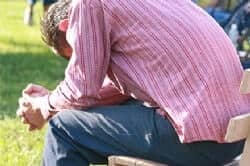
Many people believe science and faith cannot mix. Science can be observed, tested and proven. Spirituality can also be observed and tested, but many aspects of spirituality are difficult to prove. Faith is necessary when dealing with spiritual matters. But when tested over and over and the positive results appear to correlate, it seems impractical to discount what appears to be scientific proof of a spiritual matter. For example: healing through prayer.
According to Harvard University scientist Herbert Benson, MD, all forms of prayer evoke a relaxation response that quells stress, quiets the body, and promotes healing. Benson has documented on MRI brain scans the physical changes that take place in the body when someone prays. When an individual goes deeper and deeper into concentration, several physical changes take place:
The result: Everything registers as emotionally significant, perhaps responsible for the sense of awe and quiet that many feel. The body becomes more relaxed and physiological activity becomes more evenly regulated.
Traditional religious beliefs, including prayer, have a variety of effects on personal health, says Harold Koenig, MD, associate professor of medicine and psychiatry at Duke University School of Medicine, and senior author of the Handbook of Religion and Health, which documents nearly 1,200 studies done on the effects of prayer on health.
These studies show that religious people tend to live healthier lives. “They’re less likely to smoke, to drink, to drink and drive,” he says. In fact, people who pray tend to get sick less often, as separate studies conducted at Duke, Dartmouth, and Yale universities show. Some statistics from these studies:
Also, says Koenig, “people who are more religious tend to become depressed less often. And when they do become depressed, they recover more quickly from depression that has consequences for their physical health and the quality of their lives.”
arly studies of the healing power of prayer were small and often flawed. More recently, systematic investigations and clinical research are being funded, and position statements have been released from professional societies supporting the research. Some research is also being conducted concerning the power of prayer by healthy individuals on behalf of those sick. A connection is being observed between science and spirituality.
Prayer can do amazing things for physicians, patients and families. Many physicians use it in their practices routinely. If you’re not taking advantage of this “spiritual medicine,” 2017 is a good time to start.
[Jesus] replied, “If you have faith as small as a mustard seed, you can say to this mountain, ‘Move from here to there,’ and it will move. Nothing will be impossible for you.” Matt. 17:20
Source: WebMD